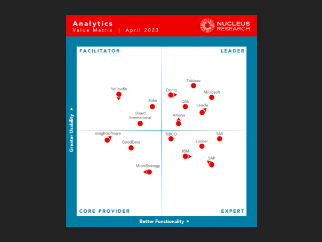Transforming your business with data apps
Small businesses have to be data-driven in order to compete with larger companies. This means having the ability to make quick and informed decisions based on data analysis. One way to do this is by using business intelligence (BI) tools to create custom data apps.
These apps can help employees become more efficient and effective in their jobs. In this blog post, we will discuss how small businesses can use data apps to transform their business.

What are data apps?
If you’re like most small business owners, you’re always looking for ways to optimize your operations and get ahead of the competition. One way to do this is by using data apps. These are custom-built applications that help employees work more efficiently with the data at their disposal.
Data apps leverage existing data sources and systems to help promote efficiency within the business. They can be used for reporting, daily monitoring, and data analysis. Data apps are great at getting employees the information they need quickly, especially if that information resides in different systems.
Why should my business use data apps?
Businesses of all types can benefit from using data apps as part of their workflows. In today’s digital economy, employees are connected more than ever before. Giving your employees access to the data they need when they need it has never been more critical. By adopting data apps into your business, you can expect several benefits.
1. Increased efficiency
Data apps promote efficiency because they allow for a single source of truth for the business. With data being stored in so many different systems, it can be quite overwhelming for an employee to find even the basic info they need. Data apps help alleviate this by consolidating data into a single platform that can be easily distributed to the entire organization. Employees only need one set of credentials to access all the data they need to do their job.
2. Increased effectiveness
Data apps also allow employees to be more effective at their jobs by providing them with more information at the exact time they need it. Timing is everything when it comes to business. By creating a data app that integrates into common business processes such as sales or customer support, reps can have access to more information than ever before. Data about every aspect of the customer can be distributed through the app. Employees will be able to make better decisions faster as they leverage data apps.
3. Faster insights
New insights can also be generated through the use of data apps. These apps are able to combine data from several different source systems and transform it to create reports and dashboards. Employees can then analyze this data as they perform their daily tasks. They will be able to uncover more insights that will benefit both them and the entire business.
4. Speed of implementation
Data apps built on BI platforms are also incredibly easy to implement because they do not require heavy back-end infrastructure. Apps are built on top of pre-existing data sources your company already uses. BI tools then offer easy ways to transform the data and present it to end-users in the form of charts and dashboards. BI is also a cloud-first tool, meaning it’s incredibly easy to access the data anywhere in the world.

Common data apps
Data apps can help organizations of all kinds perform their work better. No matter what team you are on, a data app can help you do your job faster and more effectively. If your business is considering using a data app, here are some common use cases you can get started with.
Financial reporting
Financial reporting is critical to the success of any business. Data apps can transform the way your business does its financial reporting by allowing reports such as balance sheets and income statements to update in real-time. Since a data app is connected to the underlying financial data, it can automatically update as new transactions occur within the business. With traditional financial reporting occurring quarterly or even yearly, this can have a huge impact on your business.
Sales
Sales leadership can also benefit from data apps because they can provide an overall view of the health and effectiveness of the sales organization. Apps can aggregate data from your CRM system, sales enablement tools, and email and phone calls. With a sales data app, executives can log into a single platform to view important metrics such as quota attainment, rep efficiency, and the sales pipeline for the quarter.
Inventory Management
Data apps can also be excellent at improving inventory management systems used by a business. Oftentimes, as companies grow, they adopt more and more tools to keep track of the different stages of inventory. Because of this, gaining a unified view of inventory can be quite challenging. Data apps help solve this by building on top of current inventory systems to produce a single source of truth that is both reliable and accurate.
IT Management
IT is another critical function of any organization, and it’s important to keep track of assets the company has rented out to employees. These systems can often be old and outdated, requiring on-premise databases or complicated interfaces. With a custom data app, you can create a better view for your IT leaders as they plan to onboard new employees into the system. This can greatly reduce headaches and promote efficiency with IT. That way, everyone has what they need in order to do their jobs effectively
Conclusion
Data apps can be powerful tools to help transform your business. By adopting data apps into your current business processes, you can expect increases in efficiency, effectiveness, and insights to help power your growing business. By partnering with a BI vendor that offers customized data applications, you will be able to create unique solutions specifically tailored to your business.
Regardless of the size of your business, data apps can provide numerous benefits that will help you remain competitive in today’s fast-paced business environment.
Check out some related resources:

10 Qlik Alternatives & Competitors in 2025

Elevate Your Organization's Data-Driven Culture with Strong Governance Practices






